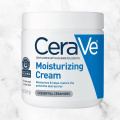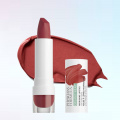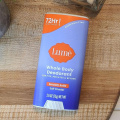Benefits of Balsamic Vinegar: Guide for a Healthy Ingredient
Packed with multi-nutrients and antioxidants, the health benefits of balsamic vinegar, an age-old Italian ingredient will make for the perfect addition to your diet.
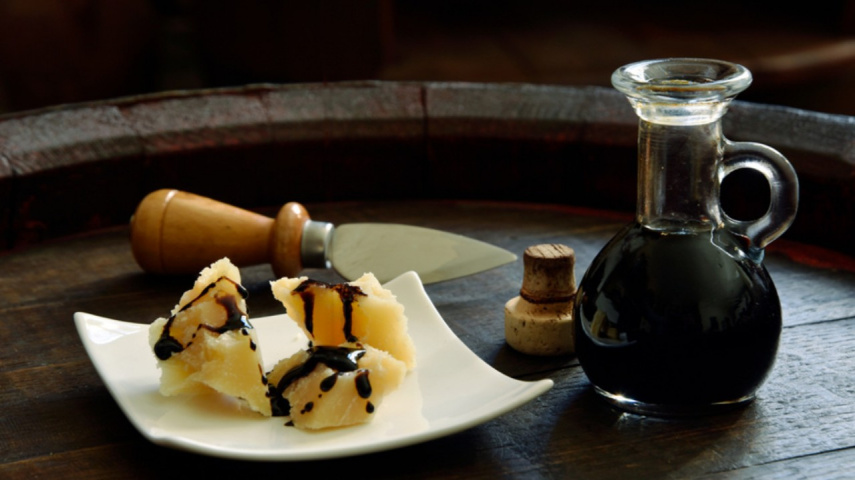
The sweet and aromatic glaze of the brown-golden balsamic vinegar is essential in the dressing section of many kitchen shelves. But what’s the glory behind this gourmet vinegar? Well, one of the major reasons has to be the numerous potential health benefits of balsamic vinegar and the longstanding history of its origin and making. Vinegar is generally a part of the rather large group of condiments that add flavor to foods. Vinegar is commonly abstracted from a single food ingredient through an alcoholic and followed by acetic fermentation. These mainstream kinds of vinegar include wine vinegar, apple cider vinegar, rice vinegar, etc. “Balsamic vinegar is commonly used for chicken and pork dishes. It can also be used for vegetable dishes like broccoli or cauliflower though. Glazed pork, or balsamic chicken with rice are quite popular options,”says Dr. Allen Conrad, a renowned chiropractor and owner of the Montgomery County Chiropractic Center. He continues, “It is sometimes added to some dessert dishes. These may include a strawberry cobbler, or a caramelized apple cake or pie,” Let’s find out more about balsamic vinegar and what makes it so distinct and in some cases so rare to obtain!
What Is Balsamic Vinegar?
Italian culinary history is synonymous with balsamic vinegar. The origin of balsamic vinegar is rooted in the ancient provinces of Modena and Reggio Emila in Italy, dating back centuries in the medieval ages. The term balsamic itself originates from the Italian word balsamico, which is associated with soothing, healing, and healthy properties. Balsamic vinegar is authentically described as having a pungent smell with a slightly sweet taste and a dark color assimilated through a significant maturation process (1).
Typically, the balsamic vinegar undergoes a long process of cooking, fermenting, and maturing to be labeled as traditional balsamic vinegar. They are produced from a variety of white grape juice– namely Lambrusco, Trebbiano, and Spergola. After being cooked, the concentration is placed in wooden barrels and made to go through alcoholic and acetic fermentation, followed by a maturing process that may last from 10 to 25 years. These gourmet vinegars are the Italian specialty, known for their intense and sweet flavor, aroma, and viscosity. A cost-effective version of balsamic vinegar is the prevalent commercial type of vinegar which has a different process, price, and quality (2). Today’s process stems from the traditional recipe, as it commonly involves cooked grape must and wine vinegar with an addition of caramel to achieve a similar color and intensity (1).
Sharing a few uses of balsamic vinegar, our contributor Mary Sabat, RDN, LD, Ace Certified Trainer at Body Designs Ltd., says, “Most people use balsamic vinegar in salad dressings, marinades, or drizzled over cooked dishes, and it can be a flavorful addition to meals without significant health concerns when used sensibly.”
Balsamic Vinegar’s Nutrition Value
Below are enlisted the calculated nutrients from 100 ml of balsamic vinegar. The popular ingredients included are wine vinegar, concentrated grape must, and caramel color (3).
- Energy: 100 kcal
- Protein: 0
- Total lipid fat: 0
- Carbohydrates: 20 g
- Sugar, including NLEA: 20 g
- Sodium: 0 mg
Check out the Essential Balsamic Vinegar Benefits

Italian culinary history is synonymous with balsamic vinegar. The origin of balsamic vinegar is rooted in the ancient provinces of Modena and Reggio Emila in Italy, dating back centuries in the medieval ages. The term balsamic itself originates from the Italian word balsamico, which is associated with soothing, healing, and healthy properties. Balsamic vinegar is authentically described as having a pungent smell with a slightly sweet taste and a dark color assimilated through a significant maturation process (1).
Typically, the balsamic vinegar undergoes a long process of cooking, fermenting, and maturing to be labeled as traditional balsamic vinegar. They are produced from a variety of white grape juice– namely Lambrusco, Trebbiano, and Spergola. After being cooked, the concentration is placed in wooden barrels and made to go through alcoholic and acetic fermentation, followed by a maturing process that may last from 10 to 25 years. These gourmet vinegars are the Italian specialty, known for their intense and sweet flavor, aroma, and viscosity. A cost-effective version of balsamic vinegar is the prevalent commercial type of vinegar which has a different process, price, and quality (2). Today’s process stems from the traditional recipe, as it commonly involves cooked grape must and wine vinegar with an addition of caramel to achieve a similar color and intensity (1).
Balsamic Vinegar’s Nutrition Value
Below are enlisted the calculated nutrients from 100 ml of balsamic vinegar. The popular ingredients included are wine vinegar, concentrated grape must, and caramel color (3).
- Energy: 100 kcal
- Protein: 0
- Total lipid fat: 0
- Carbohydrates: 20 g
- Sugar, including NLEA: 20 g
- Sodium: 0 mg
Check out the Essential Balsamic Vinegar Benefits
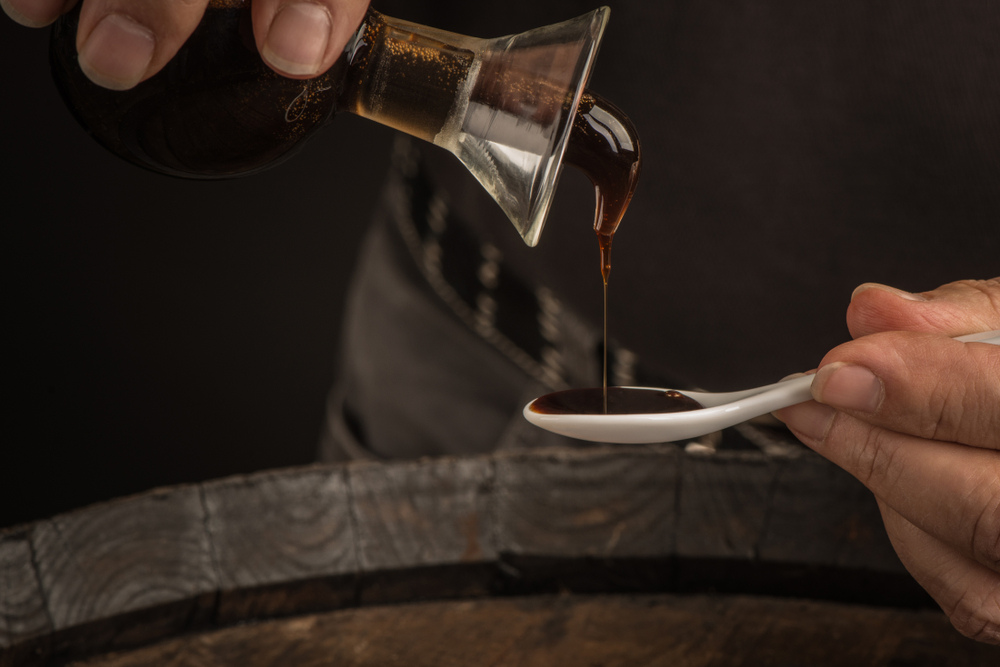
Is balsamic vinegar good for you? Under a broad spectrum, vinegar in general, including balsamic vinegar, has many benefits. Their multifold advantages make them a popular choice for health enthusiasts and have stirred a growing interest in further research. Vinegar has antioxidant properties, besides the aforementioned composition of good-for-you nutrients. With consistent intake, vinegar is known to prevent inflammation, hypertension, and lower serum cholesterol. A lot of vinegars have grown to prominence due to their use for weight loss, hair growth, and skin enhancement. Read on to know what balsamic vinegar in particular has treasured, especially due to its high economic value (2).
- Aid in Lower Cholesterol and Blood Sugar
The exaggerated spikes, during the post-meal time, in blood glucose and lipids cause an increase in oxidative stress which triggers inflammation and a heightened risk of cardiovascular incidents. Due to the presence of antioxidants in vinegar, including balsamic vinegar, it is conferred that using an increased dose of vinegar with a high in cholesterol diet can significantly reduce bad cholesterol or LDL-cholesterol (4). Consumption of vinegar also aids in the acute decrease of oxidized LDL, and total cholesterol. If you are looking to maintain or lower the cholesterol levels in your body, using balsamic vinegar may do the job and prevent clogged arteries (4). Vinegar’s antiglycemic properties can be helpful for diabetic patients, in maintaining low blood sugar levels, especially for the post-meal spike (5).
- May Maintain Low Blood Pressure Over Time
Acetic acid is one such bioactive compound present in vinegar, which shows beneficial health results. The fermentation process of acetic acid is responsible for lending the vinegar its unique aroma and flavor. Such bioactive substances are associated with cellular activities, advantageous for health (6). The examples include antimicrobial, anti-hypertension, anti-bacterial properties, and anti-obesity effects. Acetic acid is found to be a potential ingredient in vinegar to restrain metabolic syndrome.
- Works for Significant Weight Loss
The vinegar condiments, including balsamic vinegar, have anti-obesity characteristics that are linked to the bioactive present in it. The probiotic compounds result in lesser food intake and control the blood sugar spike post-meal, which can aid in weight loss (7). It was also found that a daily intake of 15 ml vinegar for 12 weeks showed a prominent decrease in body weight, total cholesterol, fat accumulation in the liver, and triglyceride in serum, in obese humans (8). Thus, with a consistent consumption of balsamic vinegar along with an appropriate lifestyle, one can achieve their weight loss goals.
- It Can Enhance Your Skin
Due to its pungent smell, balsamic vinegar may not be the one to add to your topical skincare stash! However, as mentioned earlier, the acetic acid, antioxidants, and antimicrobial compounds present in balsamic vinegar will aid in promoting better skin health. Consuming a regulated amount of balsamic vinegar is known to help one achieve clear skin with enhanced complexion. The antioxidants help fade signs of aging and reverse sun damage on the skin (9).
Side Effects of Balsamic Vinegar
ALSO READ: 10 Remarkable Benefits of Black Garlic And Its Side Effects
Balsamic vinegar is used as salad dressings in common use and has minimal to no side effects for a non-allergic person. However, exceptionally and based on the dosage, there can be instances of inflamed throat and damaged esophagus.
Speaking of the ideal dosage, Mary Sabat, a registered nutritionist, says, “Balsamic vinegar is often used as a food dressing or flavoring in cooking, and its consumption can be safe when used in moderation. There's no strict daily limit for balsamic vinegar, but it's generally considered safe to incorporate into your daily diet as long as it doesn't lead to excessive calorie consumption or discomfort.”
Drinking raw balsamic vinegar can also damage the lining of your stomach and cause uneasiness. There are also chances of getting heartburn or facing gastric problems.
Conclusion
The flavorsome condiment– balsamic vinegar can be a great match for your salads as a dressing, or a sweet balsamic glaze to drizzle and serve your health as well due to. The benefits of balsamic vinegar are plenty and is an accessible item since it is easy to make at home too. A moderate amount of balsamic vinegar that is of high quality and without natural sugar can lend many benefits to boost your overall heart health and skin.
Contributor: Mary Sabat, RDN, LD, Ace Certified Trainer - Body Designs Ltd.





 JOIN OUR WHATSAPP CHANNEL
JOIN OUR WHATSAPP CHANNEL








































